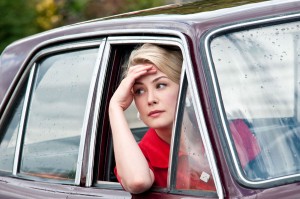Adding levity to a serious period piece
Only a few films can mix comedy and drama in a period piece, but Made in Dagenham is a rare gem that does exactly that.

Equality · Dagenham follows the true story of the 1968 strike. - Photo courtesy of Sony Pictures Classics
Made in Dagenham tells the true story of the women working in the Ford Motor Co. in 1968 who go on strike, demanding pay equal to men. Directed by Nigel Cole (Calendar Girls), the film is an inspiring tale of women who stayed true to their belief in equal rights, despite the many hurdles they had to overcome.
This British film smoothly combines humor with drama, making its audiences laugh and cry all within two hours.
The film follows 187 factory women who sew car seat upholstery. They work under horrid conditions with a leaky roof and stifling heat in the summer, and despite their skilled labor, are only paid a fraction of the men’s pay.
Their sympathetic union representative, Albert (Bob Hoskins), encourages the women to bring their grievances to Ford management, by arranging a meeting to speak with the higher ups. At the meeting Rita O’Grady (Sally Hawkins) — outraged by the lack of respect the men show her — demands that the women be given pay on par with the male workers.
With the encouragement from Albert and Connie (Geraldine James), the factory workers’ matriarch of sorts, Rita soon leads the women on strike. The company at first finds it amusing but quickly worries about the strike and its impact on the factory.
The men working in the factories, including Rita’s husband Eddie (Daniel Mays), start to resent the women on strike the entire Dagenham facility is put on temporary closure after the plant runs out of furnished seat upholstery.
However, Rita’s fight for equality begins to generate headlines around the country and the women get the attention of Barbara Castle (Miranda Richardson), the secretary of state for employment and productivity.
Castle is smart, blunt and forceful, adding a level of excitement to the film. This spark of energy makes for several comedic scenes, and Richardson does a superb job in bringing her feisty character to life.
The film brings together an impressive and noteworthy cast that delivers a great performance. Hoskins plays a key role in the film providing emotional and humorous moments, giving the movie a sympathetic male viewpoint. His facial reactions and one-liners keep the audience laughing.
Hoskin’s scenes with Hawkins are some of the strongest in the film, adding a greater level of depth to both characters.
But it’s the lead actress that steals the show. Hawkins deserves special recognition for her wonderful performance as Rita.
In essence, the role is similar to Sally Field’s title role in the 1979 film Norma Rae, but Hawkins delivers a unique, standout performance.
Rita is an identifiable character — she is a young working mother who struggles with balancing her work and her home life. She does not consider herself a leader but her great passion for equality pushes her forward to do wonderful things — it’s a classic case of an unsure person rising to the role of a hero.
This exceptionally entertaining film captures the timeless struggle of woman’s fight for equality. It pays tribute to women who have struggled and fought to be treated as equals.
The film never comes across as preachy or too much of a history lesson, because the audience is so entranced by the performances the women give in the film. The historical context is treated appropriately, not forced down the audience’s throat.
It is truly an inspiring film of an ordinary woman who achieves something extraordinary. It is a touching film that salutes women for pushing boundaries and leaves audiences with a sense of joy and hopefulness of the future.
